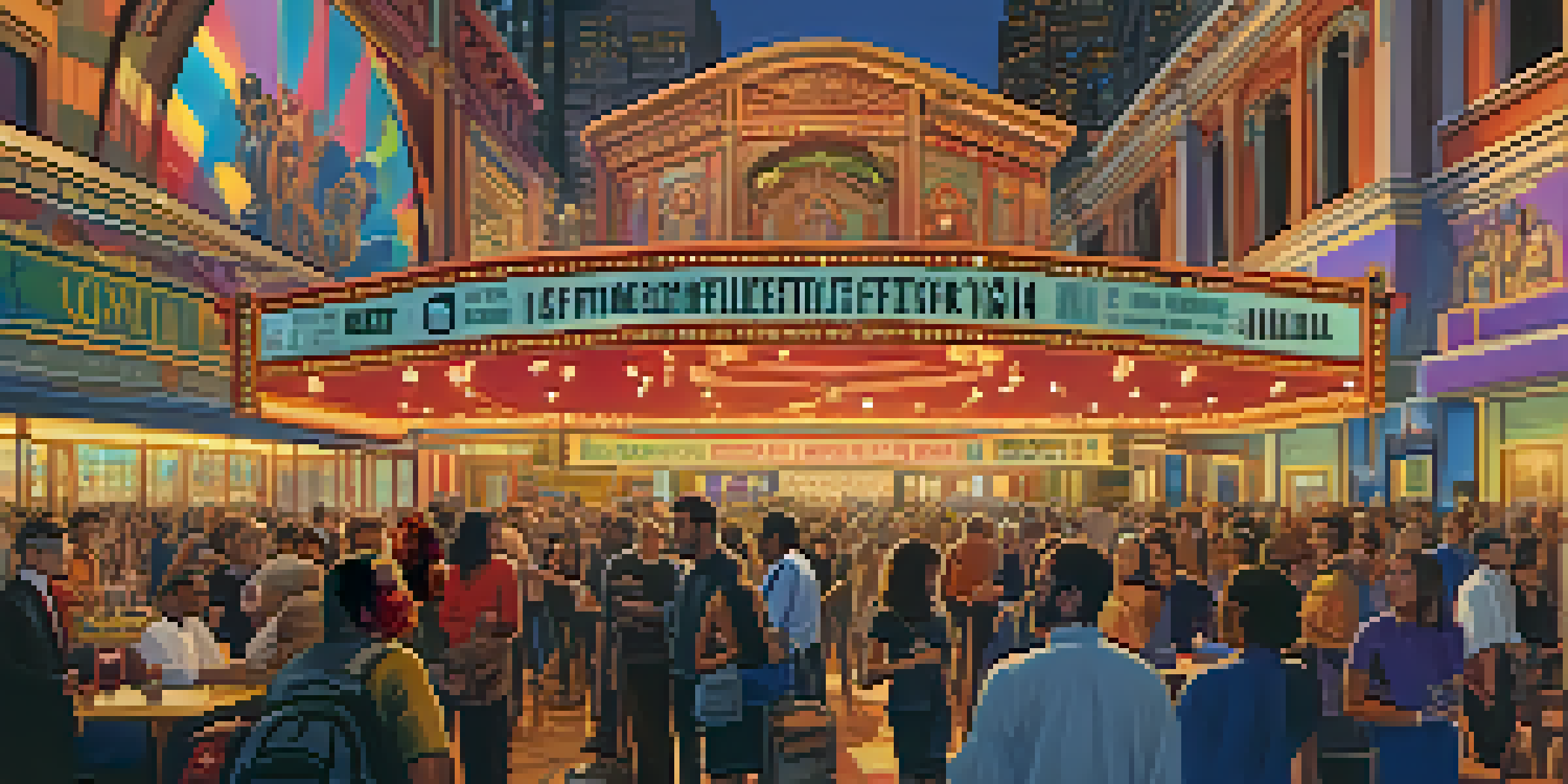The Impact of Film Festivals on Hollywood's Creative Landscape

Film Festivals: A Launchpad for Emerging Talent
Film festivals often serve as a vital launchpad for emerging filmmakers. They provide a unique platform where fresh voices can showcase their work to industry insiders and audiences alike. For many, the recognition gained at festivals like Sundance or Cannes can catapult their careers, opening doors to future projects and collaborations.
Film festivals are a great opportunity for filmmakers to showcase their work and connect with industry professionals.
Take, for instance, the story of 'The Blair Witch Project.' Premiering at Sundance in 1999, this low-budget film not only became a box office phenomenon but also revolutionized the horror genre. Such success stories illustrate how festivals can catapult unknown filmmakers into the spotlight, fostering a new wave of creativity in Hollywood.
Moreover, festivals encourage diversity in storytelling by highlighting films from underrepresented communities. This not only enriches the cinematic landscape but also prompts Hollywood to pay attention to voices that have been historically marginalized.
Networking Opportunities: Connecting Creatives
One of the most significant benefits of film festivals is the networking opportunities they provide. Creatives from various backgrounds come together, creating an environment ripe for collaboration. Filmmakers, actors, producers, and distributors mingle, share ideas, and forge connections that can lead to exciting new projects.

Imagine a director meeting a producer over coffee at a festival; that casual conversation could lead to a multi-million dollar collaboration. The relationships built in these informal settings often prove to be invaluable, allowing creativity to flourish outside the constraints of traditional Hollywood.
Festivals Launch Emerging Filmmakers
Film festivals provide a crucial platform for new filmmakers to gain recognition and propel their careers.
Moreover, these connections help filmmakers secure funding and distribution for their projects, which can be a daunting task in the competitive landscape of Hollywood. Festivals thus play a crucial role in bridging the gap between vision and reality.
Spotlighting Innovative Storytelling Techniques
Film festivals are often at the forefront of showcasing innovative storytelling techniques. By presenting unique narratives and experimental formats, they challenge conventional filmmaking norms. This pushes established filmmakers to think outside the box and embrace new styles and technologies.
Cinema is a mirror by which we often see ourselves.
For example, the rise of virtual reality (VR) experiences at festivals is changing how stories are told. Audiences are no longer passive viewers; they can now immerse themselves in a narrative, creating a more engaging experience. This innovation encourages filmmakers to experiment with their craft and explore new dimensions of storytelling.
As these new methods gain traction, Hollywood is influenced to adapt and evolve, leading to a more dynamic and creative industry. Festivals thus play a pivotal role in shaping the future of filmmaking.
Audience Feedback: Shaping Future Projects
Another critical aspect of film festivals is the direct feedback filmmakers receive from audiences. Screenings often include Q&A sessions, where creators can discuss their work and hear audience reactions firsthand. This immediate feedback can guide future projects and help filmmakers refine their narratives.
For instance, a film that resonates well with viewers might inspire a sequel or spin-off, while constructive criticism can lead to significant changes in tone or direction. Audiences become an integral part of the creative process, influencing the direction of future films.
Networking Fuels Creative Collaborations
These events create valuable networking opportunities that connect filmmakers, actors, and producers, leading to potential collaborations.
In this way, festivals not only celebrate completed works but also serve as a testing ground for ideas and concepts, fostering a more responsive and evolving Hollywood landscape.
Cultural Exchange: Films as a Reflection of Society
Film festivals act as a cultural exchange platform, showcasing films from around the world. They allow audiences to experience diverse perspectives that reflect different societal issues, cultures, and narratives. This exposure broadens Hollywood's understanding of global storytelling.
Take the Toronto International Film Festival, which features films from various countries, each presenting unique cultural lenses. This not only enriches the festival experience but also inspires Hollywood filmmakers to incorporate diverse elements into their stories.
As a result, the films produced in Hollywood often reflect a more globalized society, leading to a richer and more varied cinematic landscape. Festivals thus play a crucial role in promoting cultural awareness and understanding through film.
Recognition and Awards: A Boost for Creatives
Winning an award at a film festival can significantly elevate a filmmaker's career. Recognition from prestigious festivals can lead to increased visibility and credibility, making it easier to secure funding and distribution. This validation encourages filmmakers to continue pushing creative boundaries.
Consider how films like 'Moonlight' and 'Parasite' gained global acclaim after their festival debuts. These films not only won prestigious awards but also opened doors for their creators, allowing them to take on larger projects and explore new storytelling avenues.
Festivals Foster Diverse Storytelling
By showcasing films from various cultures, festivals promote diverse narratives that enrich the cinematic landscape.
Moreover, awards can also shift industry trends, as studios take note of what resonates with audiences and critics alike. This influence leads to a more adventurous and diverse creative landscape in Hollywood.
Promoting Independent Cinema: A Vital Ecosystem
Film festivals play a crucial role in promoting independent cinema, which often struggles for visibility in a market dominated by blockbuster films. By providing a platform for independent filmmakers, festivals help nurture a vital ecosystem that fosters creativity and innovation. This support is essential for the growth of diverse storytelling.
For instance, festivals like Tribeca and SXSW highlight independent films that might not otherwise receive mainstream attention. These platforms help connect independent creators with audiences eager for fresh narratives, ensuring that a variety of voices are represented.

As independent cinema flourishes, it challenges Hollywood to take risks on unconventional stories and formats, ultimately enriching the overall creative landscape.
The Future of Film Festivals in Hollywood
As the film industry continues to evolve, so too will the role of film festivals in Hollywood. With the rise of digital platforms and changing consumption habits, festivals may adapt to include more virtual elements, reaching broader audiences beyond physical locations. This evolution could enhance accessibility and inclusivity in the film community.
Moreover, as filmmakers increasingly seek new ways to tell their stories, festivals will likely continue to be a breeding ground for innovation. The integration of technology, such as virtual reality and interactive storytelling, will challenge traditional formats, pushing creatives to explore uncharted territories.
Ultimately, the impact of film festivals on Hollywood's creative landscape will remain significant, as they continue to inspire, connect, and promote diverse voices in filmmaking. The future promises to be as exciting as ever, with festivals leading the charge.